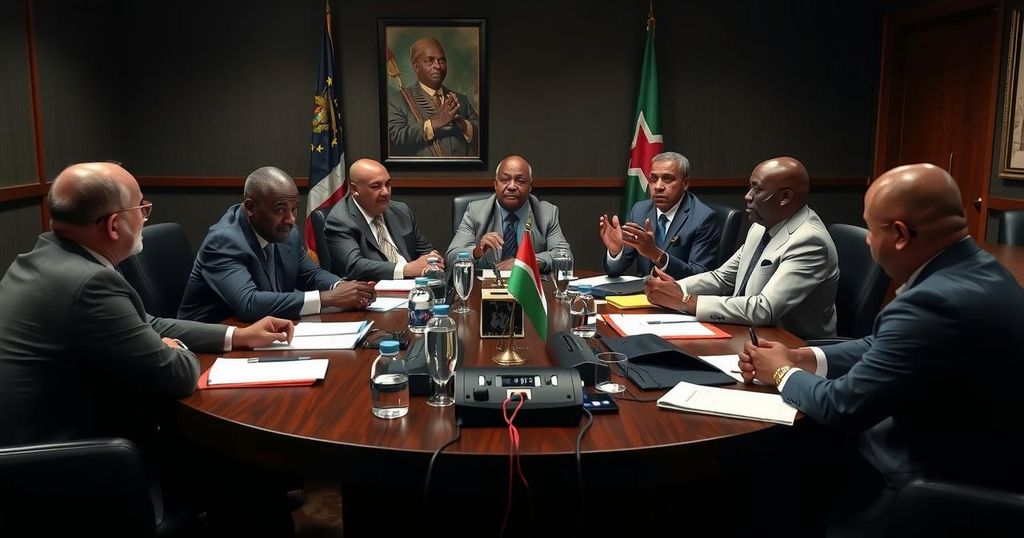World news
AFRICA, BBC, CIVIL WAR, CONFLICT, DARFUR, DAVID LAMMY, DMITRY POLYANSKIY, EUROPE/ASIA, HUMANITARIAN CRISIS, LAMMY, LINDA THOMAS - GREENFIELD, NEW YORK, NORTH AMERICA, RAPID SUPPORT FORCES, REFUGEE CRISIS, RSF, RUSSIA, SECURITY COUNCIL, SIERRA LEONE, SUDAN, UK, UN, UN SECURITY COUNCIL, UNITED STATES, US, WAR
Jamal Robinson
0 Comments
Russia’s Veto of UN Ceasefire Resolution Sparks International Outrage Over Sudan Conflict
Russia has vetoed a UK-supported UN resolution for a ceasefire in Sudan, prompting strong condemnation from the UK and US. The Sudanese civil war has resulted in tens of thousands of deaths and millions displaced, fueling one of the world’s worst humanitarian crises. Calls for action coincide with allegations of human rights violations from both the army and RSF, complicating international diplomatic efforts to restore peace.
In a significant geopolitical development, Russia has exercised its veto power against a United Kingdom-backed UN Security Council resolution that called for a ceasefire in Sudan, a move heavily criticized by both the UK and the United States. British Foreign Secretary David Lammy condemned the veto as “disgraceful,” emphasizing its adverse impact on the ongoing civil conflict in Sudan, which has resulted in tens of thousands of deaths and displaced over 11 million individuals, leading to a monumental humanitarian crisis. The UN draft resolution, put forth by the UK and Sierra Leone, sought an immediate cessation of hostilities by both warring factions—the Sudanese army and the paramilitary Rapid Support Forces (RSF)—and urged them to engage in discussions aimed at a national ceasefire. It specifically called for the protection of civilians amidst reports of severe human rights violations, notably in Darfur. However, Sudan’s representation at the UN expressed concerns that their recommended amendments were not incorporated into the resolution. Following the vote, where all but one of the Security Council’s 15 member states supported the draft, US Ambassador Linda Thomas-Greenfield accused Russia of hindering necessary actions to ameliorate the dire circumstances afflicting Sudan. Russia, through its envoy Dmitry Polyanskiy, countered these accusations, asserting that the resolution would compromise Sudanese sovereignty and represent a Western agenda to interfere in the region. Both the Sudanese army and RSF have been implicated in human rights abuses that could rise to the level of war crimes, creating a complex political landscape fraught with ramifications for the local population and geopolitical relations. The Sudanese ambassador to the UN criticized the lack of inclusion of clauses condemning foreign support of the RSF and classifications of the RSF as terrorists, seeking international recognition for the severity of the situation.
The ongoing civil war in Sudan commenced in April of the previous year, ignited by a fierce power struggle between the Sudanese army and the RSF, a powerful paramilitary group. As the conflict has unfolded, it has escalated into one of the world’s most severe humanitarian crises, prompting calls from various international actors for intervening actions to safeguard civilians and restore peace. Historical tensions in Sudan, combined with external influences and geopolitical rivalries, further complicate the crisis, necessitating nuanced diplomatic efforts for resolution.
In conclusion, the veto by Russia against the UN ceasefire resolution highlights significant geopolitical tensions and complicates an already dire humanitarian situation in Sudan. While international stakeholders, including the UK and US, have voiced strong opposition to the veto, the matter underscores the challenges of addressing the conflict in a manner that respects Sudanese sovereignty, amidst ongoing humanitarian and political crises that require immediate attention.
Original Source: www.bbc.co.uk




Post Comment